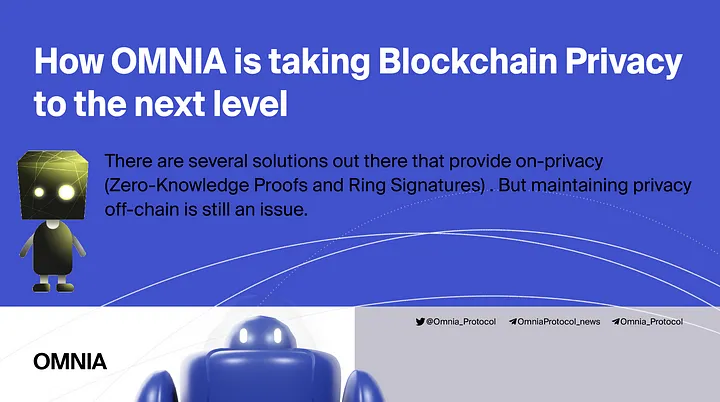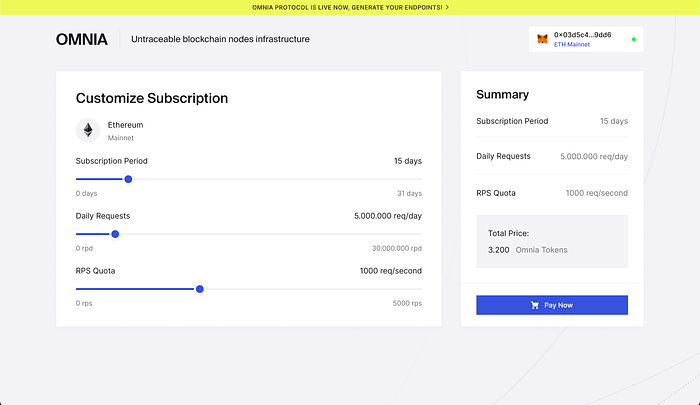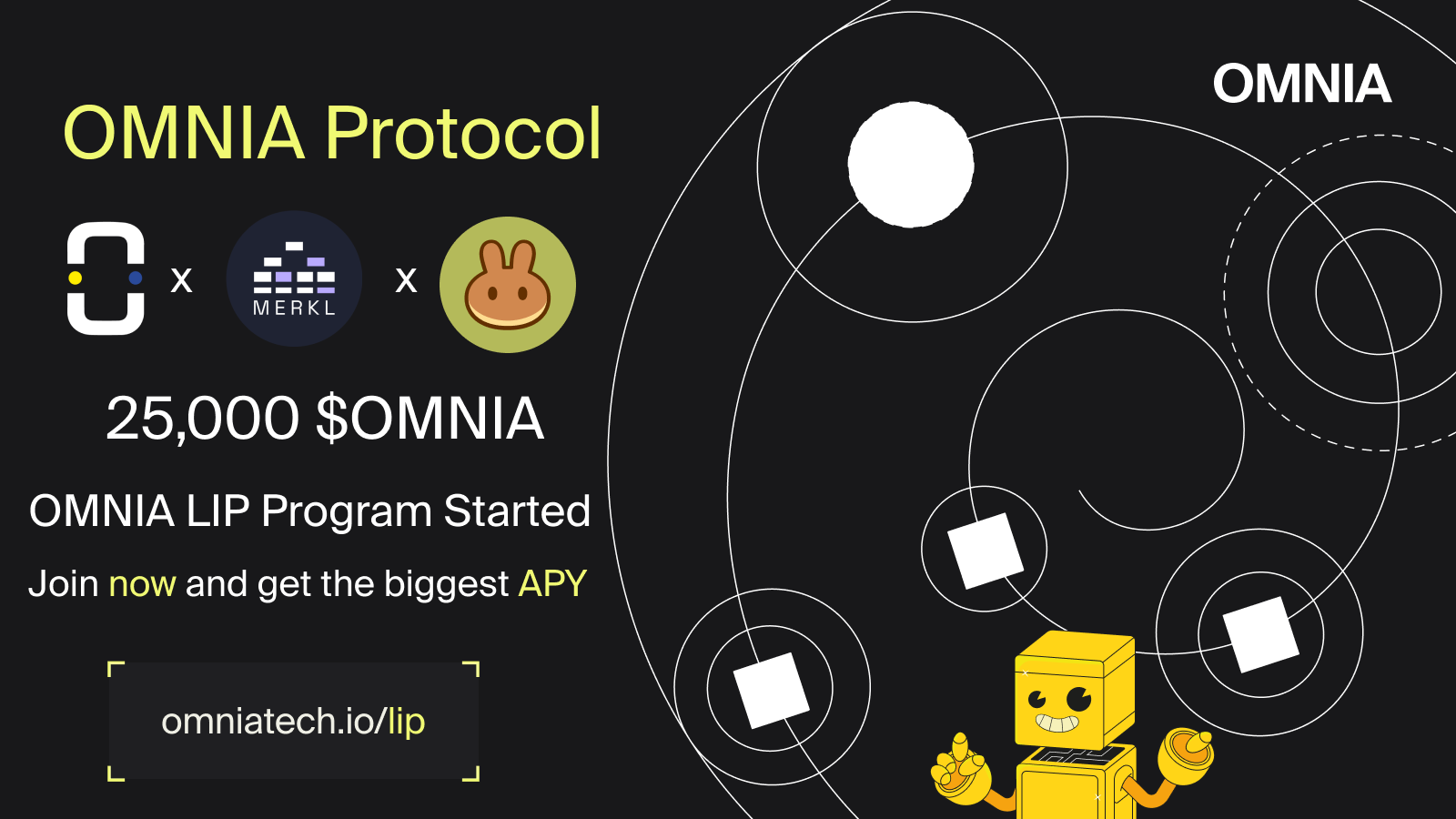
How OMNIA is Taking Blockchain Privacy to the Next Level
Blockchain is not really decentralized
The decentralized and autonomous nature of blockchain is undoubtedly one of the key attractions for most users. Unfortunately, however, blockchains aren’t as privacy-focused and indestructible as one might think. In particular, accessing the blockchain infrastructure is controlled by several large corporations that act as node providers.
The invisible hands of dominant corporations
These corporations manage nodes that verify transactions on the different blockchains. Unfortunately, this puts them in a prime spot to harvest and exploit metadata and use it to their advantage. This dominance is quite contradictory to the decentralized concept of blockchain.
But where there is big money to be made, large corporations and centralized power will undoubtedly look to get a piece. So what can be done about this problem, and how can blockchains remain truly autonomous and decentralized? That’s precisely the problem OMNIA is looking to solve.
What is Omnia?
Decentralized, swift, yet secure

Omnia is a truly decentralized infrastructure that allows users to access blockchains securely. The primary objective of the Omnia Protocol is to provide a secure environment for users while also avoiding the centralization of power and control. Thus, minimizing the possibility of outages or bottlenecks brought on by the failure of a node or other consolidated infrastructure.
Truly anonymous

Omnia places a heavy emphasis on anonymity, allowing users to access the blockchain in an untraceable manner.
The Omnia infrastructure consists of blockchain nodes (the ones already existing for BTC, ETH, BSC, etc. and shared by the community) and privacy relayers (that can be run by anyone), serving as decentralized API gateways to the blockchain.
Users can serve both as a relayer and a node owner. Still, when that happens, all requests directed to that relayer will be forwarded to another node owner, preserving anonymity at the infrastructure level.
Easy to open a node, easy to earn reward
Operating a node can already be a lucrative investment, but Omnia takes that a step further by providing additional rewards when sharing a node with OMNIA.
First, Omnia provides a user-friendly web interface for node owners to register their nodes. Then, as a result, the relayers index these nodes, and use mixnets to protect privacy and preserve anonymity when forwarding requests.
Omnia users can create their subscription plans based on their blockchain request rate requirements. As a result, customers get secure RPC endpoints (HTTP or WSS) for any blockchain networks available.

The Problems OMNIA is Here to Solve
There are several solutions out there that provide privacy while on the blockchain. Zero-Knowledge Proofs and Ring Signatures are just a few examples.
But maintaining privacy off-chain is still an issue.
Managed Access to the blockchain
Big companies are pulling the string
One of the fundamental problems facing the decentralization of a blockchain is the centralized control node providers have. This gap can leave users at the mercy of the node provider in several different ways. For one, users can easily have their metadata skimmed and recorded without any authorization. It also creates a bottleneck that could cause massive outages if the nodes were to go down. It happened again quite recently actually.
OMNIA secures the chain
OMNIA Protocol aims to solve these issues differently. For one, node owners can easily register their node through the simple-to-use web interface. These nodes are then indexed by relayers while remaining anonymous due to mixnets. In addition, the node owners receive incentives by providing their nodes to users.
OMNIA is protected against malicious attempts
OMNIA’s node verification protocol ensures that node owners don’t act against user interest. That’s because node providers must stake a proportional amount of OMNIA tokens. So if the provider attempts to act maliciously, their staked tokens could be slashed.
Off-Chain Privacy Issues
Privacy is critical
In our world today, users can’t underestimate the importance of privacy, particularly in the intricate marketplaces like DeFi. Moreover, a secure infrastructure is crucial to the development of any solution or product. Therefore, privacy should be a top priority, and we should ensure it at every stage of the blockchain interaction, including reading and writing data.
Most current blockchain privacy solutions are geared towards on-chain privacy, allowing individuals to anonymously trade, exchange, and transfer assets on the blockchain. Unfortunately, there isn’t an all-encompassing solution that covers the process end-to-end. That gap can leave potential holes in coverage, meaning users could lose anonymity.
Mixnet saves the day
OMNIA uses a routing protocol known as mixnets to ensure privacy is maintained throughout the process. OMNIA then takes it a step further by leveraging academic and security research expertise to complement mixnets. By utilizing cutting-edge technologies for timing obfuscation and decoy traffic injection, maximum anonymity can be assured.

Incentives to Nodes
There is generally no reason for non-mining nodes to share their resources (data, JSON RPC interface) to others. Furthermore, there is a bias in most blockchains: too many light clients and not enough full nodes to handle them all. This contrast has significant ramifications for the network’s state, and designing the correct incentives is one approach to lessen the effects.
The vision behind OMNIA’s infrastructure supports compensation to every node as incentives for the services they provide. Additionally, mining/staking nodes can make additional revenue on top of block/stake rewards by connecting to OMNIA infrastructure.
Monitored Blockchain Requests
People can use the metadata of each pending transaction to track and monitor requests to node providers on the blockchain, resulting in fear, uncertainty, and doubt (FUD). Additionally, traders and investors could potentially purchase this information to put themselves in a more advantageous position.
With the complete anonymity and decentralized protocol offered by OMNIA, user metadata is no longer trackable. The obscurity ensures an even playing field and complete privacy throughout the process of a transaction.
Key Takeaways
Centralized access to blockchain
Currently, accessing the blockchain network is controlled by a few centralized corporations. OMNIA ensures other node providers can register their nodes through a simple-to-use web interface to receive incentives.
Private and secure access to blockchain network with Omnia
In addition, there has been a vital need for a privacy solution protocol to access the blockchain. OMNIA Protocol meets that need perfectly by providing a secure access point to the blockchain. It allows users to use the blockchain network without fear of their transactions being traced.
Appropriate rewards for node providers
But the benefits of the protocol don’t end there as it rewards node providers, thus incentivizing node providers to adhere to stricter guidelines and preserve the anonymity of their users.


